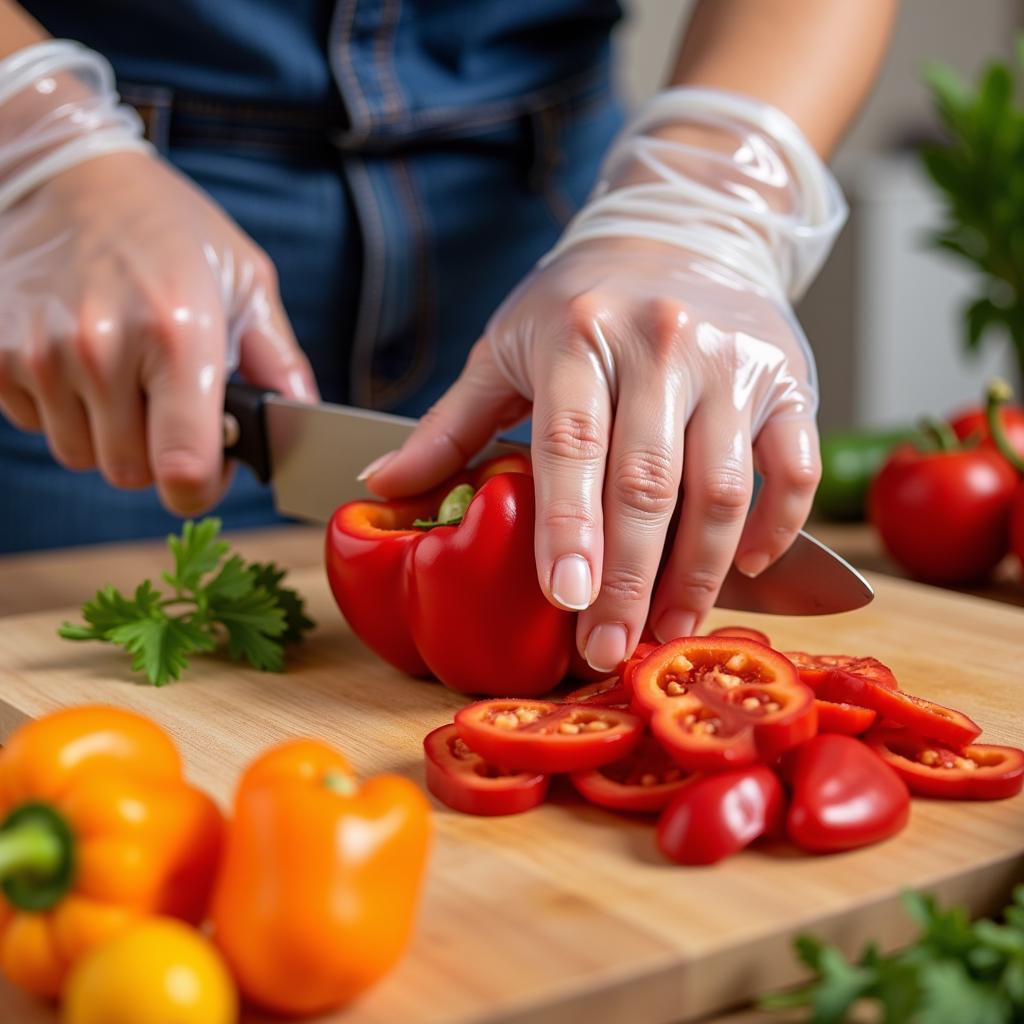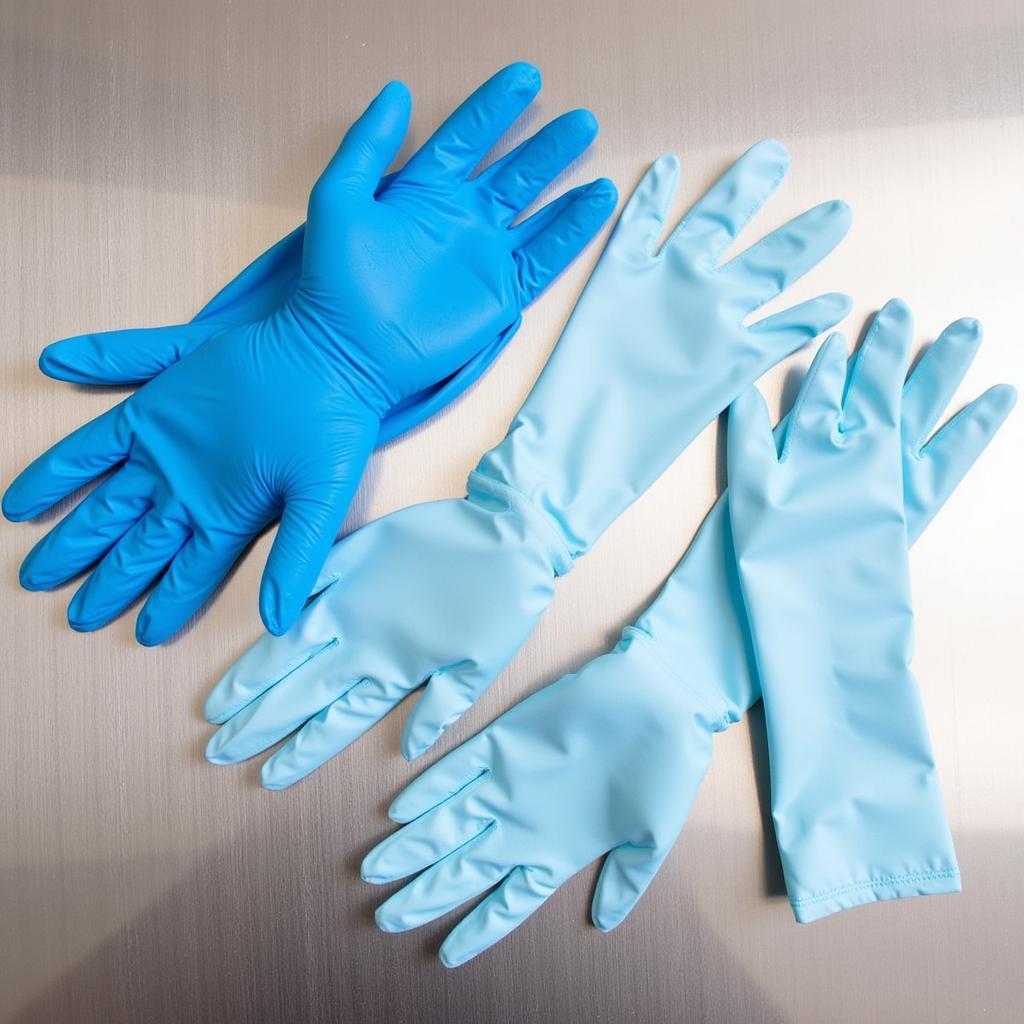Vinyl gloves are a common sight in many industries, from healthcare to cleaning. But Can You Use Vinyl Gloves For Food Prep? It’s a question many home cooks and even professional chefs have pondered. After all, food safety is paramount, and using the right gloves can make a big difference.
The Scoop on Vinyl Gloves and Food Safety
While vinyl gloves might seem like a good option for food handling at first glance, there are some important factors to consider. Let’s break it down:
Pros of Using Vinyl Gloves:
- Cost-effective: Vinyl gloves are generally the most affordable type of disposable glove.
- Loose fit: This can be beneficial for tasks that require frequent glove changes or for individuals who find tighter-fitting gloves uncomfortable.
- Latex-free: A good alternative for people with latex allergies.
Cons of Using Vinyl Gloves:
- Not as durable: Vinyl gloves can tear more easily than other types of gloves, like nitrile, especially when handling sharp objects.
- Poorer chemical resistance: Vinyl offers limited protection against certain chemicals and cleaning agents sometimes used in food prep.
- Potential for allergens: While vinyl itself is latex-free, the manufacturing process can sometimes involve cross-contamination with latex allergens. This is something to be mindful of for those with severe latex sensitivities.
 Food worker wearing vinyl gloves while chopping vegetables
Food worker wearing vinyl gloves while chopping vegetables
When Vinyl Gloves Might Be Okay for Food Prep
In certain situations, vinyl gloves might be an acceptable choice for food handling:
- Low-risk tasks: For tasks that involve minimal handling of food and no contact with raw meat, poultry, or fish, like serving pre-packaged snacks or pouring drinks.
- Short-duration tasks: When you need a glove for a very brief period, like quickly assembling sandwiches.
When to Choose Alternatives to Vinyl Gloves
For optimal food safety and peace of mind, it’s generally recommended to opt for alternatives to vinyl gloves in the following scenarios:
- Handling raw meat, poultry, or fish: These foods can harbor bacteria that vinyl gloves might not effectively protect against.
- Working with sharp objects: The risk of punctures and tears is higher with vinyl, making it less suitable for tasks like chopping or deboning.
- Extended use: If you’re prepping food for a longer duration, the durability of vinyl becomes a concern.
 Assortment of food-safe gloves
Assortment of food-safe gloves
Better Options for Food Handling Gloves
- Nitrile gloves for food prep: Nitrile gloves are highly puncture-resistant, offer superior protection against contaminants, and are a popular choice in professional kitchens.
- Single use gloves food industry: These gloves are designed specifically for food handling and are available in a range of materials to suit different needs.
“When it comes to food safety, it’s always best to err on the side of caution,” advises Chef Emily Carter, a seasoned culinary instructor with over 20 years of experience. “Investing in high-quality, food-safe gloves is essential for protecting both yourself and your customers.”
Conclusion
While vinyl gloves can be tempting due to their affordability, they might not always be the best choice for food prep. Understanding their limitations and when to opt for alternatives is crucial for ensuring optimal food safety in any kitchen. Remember, using the right gloves is a simple yet powerful step in preventing foodborne illnesses and maintaining a healthy environment.
FAQs
Q: Are vinyl gloves food-grade?
A: While vinyl gloves are used in some food handling settings, they might not provide the same level of protection as other food-grade gloves like nitrile.
Q: Can I wash and reuse vinyl gloves?
A: Vinyl gloves are designed for single use and should not be washed or reused. Washing can compromise their integrity and increase the risk of contamination.
Q: What are the signs of a vinyl glove allergy?
A: Symptoms of a vinyl glove allergy can include skin irritation, redness, itching, or hives.
Q: Where can I find reliable food processing supplies?
A: Check out reputable restaurant supply stores or online retailers specializing in food service products.
Q: What are some other essential food safety practices besides wearing gloves?
A: Frequent handwashing, proper food storage, thorough cooking, and avoiding cross-contamination are all crucial for maintaining food safety.
For more information on food safety and best practices in the kitchen, explore our other informative articles on gloves for food handling and food service gloves do what.
Need personalized advice on choosing the right gloves for your needs? Contact us! Our team at Mina Cones Food is available 24/7 to answer your questions. Reach us at Phone Number: 02437655121, Email: minacones@gmail.com, or visit us at 3PGH+8R9, ĐT70A, thôn Trung, Bắc Từ Liêm, Hà Nội, Việt Nam.